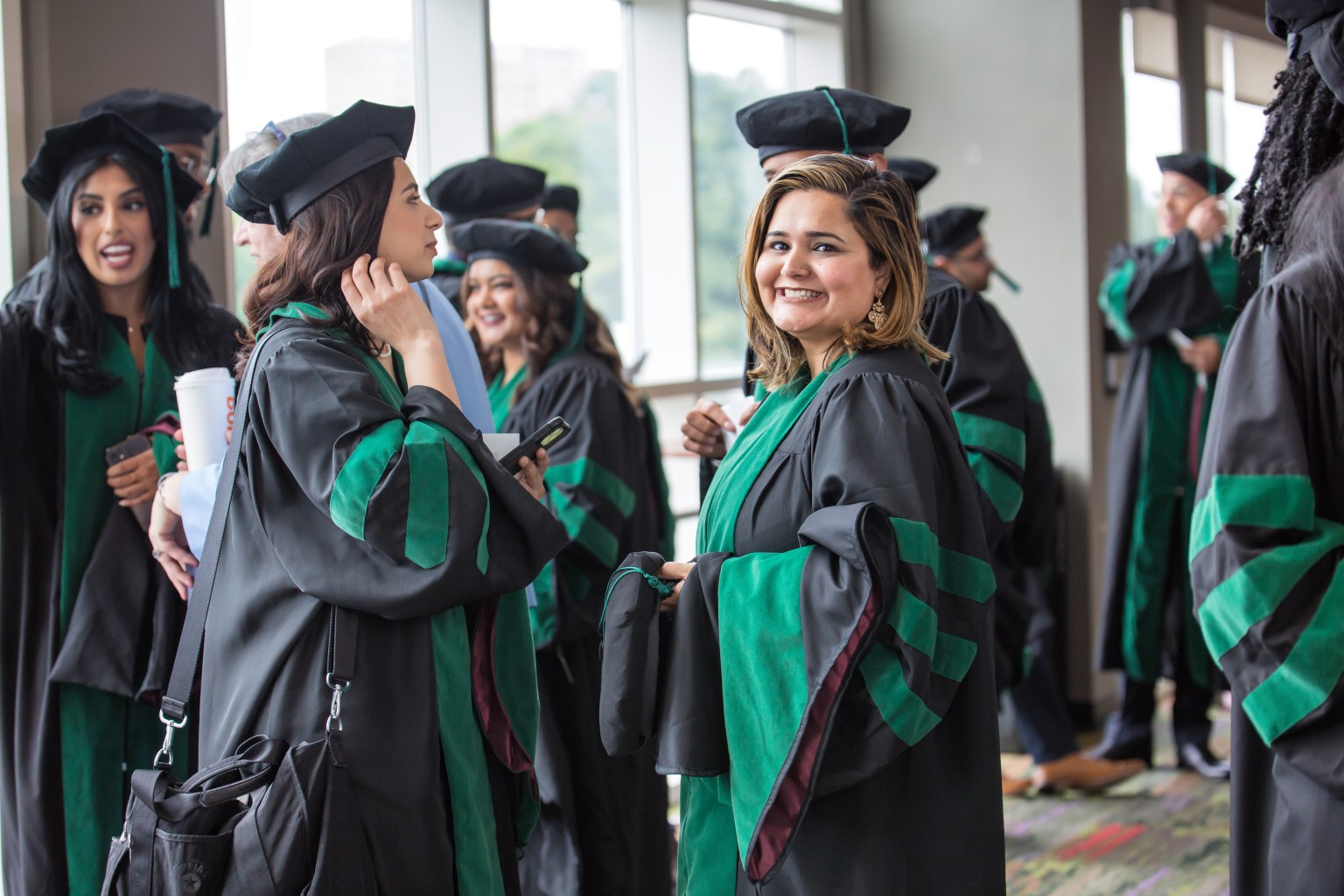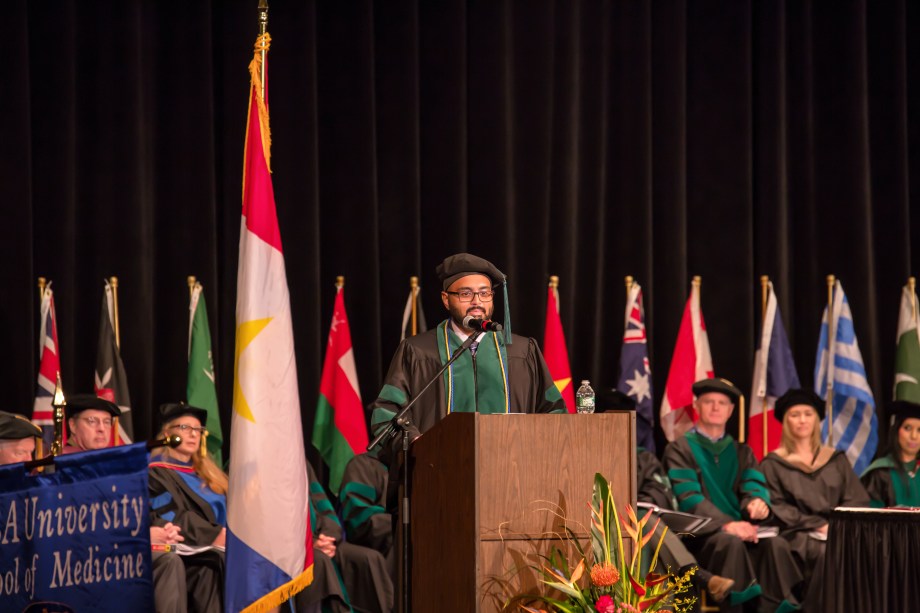
The Journey Continues After Medical School Graduation
Discover the path to come after medical school graduation: residency, USMLE Step 3, board exams, job applications and continuing education.

Congratulations to the Medical University of the Americas graduating class of 2024!
For those dreaming of attending medical school, graduation can seem a very long way away. However, the truth is that this exciting milestone is really the beginning of a rewarding journey towards becoming a practicing physician. If you do not yet know what this journey entails, then keep on reading!
The post-graduation journey includes a series of pivotal stages in hands-on training and career development. In this post, we’ll highlight the important stages that new doctors progress through after graduating from medical school.
Key Milestones for Medical School Graduates
Residency
The first year of a residency program is generally called an “internship” and participants are termed “interns.” Following this period, new doctors become “residents” and continue through their residency programs for anywhere from two to six more years, depending on the specialty being pursued. During this time, residents gain:
- Clinical Skills and Knowledge: Residents learn to provide impactful hands-on care independently, while still ultimately under the supervision of senior physicians.
- Focused Training: All residency programs provide focused training in a specific medical field.
- Professional Growth: New doctors continue developing critical thinking skills, professional knowledge and communication abilities when connecting with patients, families and fellow medical team members.
- Board Certification: Residents are prepared to pass the board certification exams necessary to become independent doctors in their chosen specialties.
While certainly a busy and challenging time, residency is crucial for those developing successful medical careers. It significantly develops patient care skills and knowledge, as well as the confidence new doctors need to support their very own patients in the future.
Didn’t Match Into Residency?
Not securing a residency program spot after medical school is not the end of the road. There are meaningful options in such a scenario:
- Apply Again Next Year: Many students take that one year gap as an opportunity to improve their application by gaining more experience in medicine, conducting important medical research or otherwise enhancing their resume.
- Transition Programs: Transition or preliminary programs can provide additional training and experience, making applicants better candidates for residency programs.
- New Medical Pathways: Some graduates explore other career opportunities, such as professional research, public health or medical administration.
Medical University of the Americas (MUA) graduates have achieved a 98% residency placement rate over the past several years (2020-2024). This means that an MD program student’s chance of matching into residency is extremely high at MUA!
USMLE Step 3
The United States Medical Licensing Examination (USMLE) Step 3 examination occurs during residency and is the final part of the USMLE series of exams. Steps 1 and 2 occur during medical school, after the 5th and 10th semesters, respectively. Step 3 is a two-day test that assesses a new doctor’s ability to apply learned medical knowledge and clinical health practices, which are essential for a successful career as an unsupervised medical practitioner. Successfully passing Step 3 is necessary for those who intend to practice independently in the United States.
- Day 1 involves evaluating a new doctor’s facility with medical knowledge and scientific principles. Participants will complete approximately 233 multiple-choice questions, spread over six 1-hour examination blocks. The questions cover a variety of subjects, including ethics, safety, medical principles and much more.
- Day 2 covers clinical practices and patient support. It provides approximately 180 multiple-choice questions, spread over six 45-minute exam periods. You will also complete 13 computer-based case simulations (CCS) that deliver real-world scenarios to test the participants’ ability to make care decisions and apply scientific knowledge.
Beginning Your Career
Specialty Board Examinations
Specialty board exams occur near the end of residency. These exams certify that you have the skills and capacity necessary to practice independently in your chosen specialty. Successfully completing such exams is necessary for obtaining hospital privileges and insurance panel participation.
Fellowship Programs
Some doctors choose to pursue additional training after residency, in what are called fellowship programs. Such programs provide enhanced training in medical subspecialties, such as ophthalmology, gastroenterology and hematology. Fellowships can last up to three years and help new doctors develop extremely specialized abilities and knowledge.
Applying for Jobs
Don’t forget, even doctors must apply for jobs! After residency (and possibly a fellowship), it’s time to begin applying. Whether the goal is working at a hospital, private practice or in education/training, job searching is a must for those just launching a career in medicine.
The Learning Always Continues
Medical knowledge, techniques and treatments are always improving and evolving. This makes developing a thirst for learning essential for all future doctors. In fact, in many countries (the U.S. and Canada included), continuing education is mandatory for maintaining licensure status.
Lifelong learning helps medical practitioners stay current on the most useful research, technologies and therapies. This enables doctors to provide more accurate diagnoses, effective recommendations and functional treatments. It also enhances communication abilities and interpersonal skills, thereby improving the experiences of patients and their families.
A commitment to learning can mean attending workshops, going to conferences and completing Continuing Medical Education (CME) courses. For example, in the United States, physicians might attend the American Medical Association’s (AMA) annual conference or participate in CME courses offered by top-notch medical institutions. In Canada, doctors may attend the Canadian Medical Association’s (CMA) General Council meeting or engage in CME activities through the Royal College of Physicians and Surgeons of Canada.
Conclusion
Remember, graduating from medical school is not the end of your journey; rather, it marks the beginning of an exciting new chapter. From resident to fully licensed practitioner, there is so much to learn and do. Always aim to enjoy the moment, do what’s best for your patients, keep learning and get better every day – your medical career will benefit greatly from it!
Interested? Explore the 4-Year MD Program at Medical University of the Americas to begin your meaningful journey in medicine today. You can learn more about our school by checking out this testimonial video from a practicing alum:
Then contact us if you have questions or need support; you can also easily start your application today!
